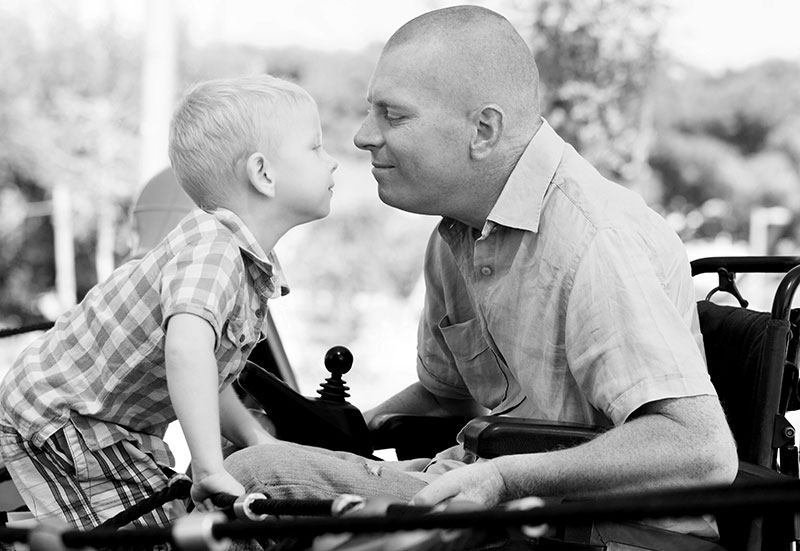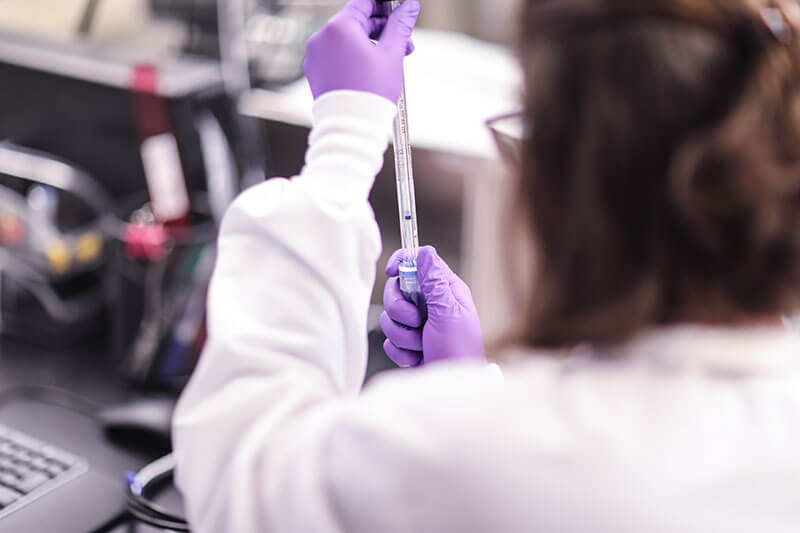Learn about our AAV gene therapy clinical trials
While we help raise awareness of clinical research opportunities, enrolling physicians are responsible for screening potential patients and confirming their eligibility. Eligibility criteria, based on pre-determined requirements related to the disease and the patient’s medical history, are described in the ClinicalTrials.gov study postings. These criteria allow us to conduct studies as safely as possible and control for health and disease factors that make it easier to compare results across study participants.
Clinical Trial: Late-Onset Pompe Disease
Status: Active, Not Recruiting
More information
AskBio’s clinical trial for late-onset Pompe disease (LOPD) with the therapeutic gene ACTUS-101 is currently active and not recruiting. The current standard of care for Pompe disease is enzyme replacement therapy (ERT).
ACTUS-101 is infused intravenously and designed to deliver a functioning copy of the GAA gene (malfunctioning in Pompe disease) to the liver.
The primary objective of this study is to assess multiple doses of ACTUS-101 in patients with Late-Onset Pompe Disease (LOPD), as well as assess the impact of this treatment on patient health as measured by changes in exercise capacity (6-minute walk), pulmonary function, and other factors including quality of life1.
For more information, visit clinicaltrials.gov or email us.
1Quality of Life assessments will include the Fatigue Severity Scale, Rasch Pompe Specific Activity Scale, and the National Institutes of Health Patient Reported Outcomes Measurement Information Systems (NIH PROMIS) short forms for fatigue, physical function, and pain interference that are relevant to the LOPD population. In addition, the Hemophilia Caregiver Impact (HCI) measure will be included to understand patient treatment burden for ERT. Subjects will complete these instruments as outlined in Appendix 1, and Appendix 2.
Clinical Trial: Congestive Heart Failure
Status: Recruiting
More information
GenePHIT is a Phase 2 adaptive, double-blinded, placebo-controlled, randomized, global multi-center trial to evaluate the safety and efficacy of the one-time administration of AB-1002, via antegrade intracoronary artery infusion, in males and females age >18 years with cardiomyopathy and New York Heart Association (NYHA) Class III heart failure symptoms.4 Subjects are randomized into one of three treatment groups in a 1:1:1 fashion to either low dose, high dose, or placebo. Primary outcome measures include cardiovascular related death and change from baseline in NYHA classification, left ventricular ejection fraction (LVEF), and Six Minute Walk Test (6MWT).4
For more information, please visit clinicaltrials.gov (NCT#05598333).
Clinical Trial: Multiple System Atrophy
Status: Active, Not Recruiting
More information
We are currently enrolling patients within four years of diagnosis with the parkinsonian subtype of MSA (MSA-P) into a Phase 1 randomized control trial that is testing the safety and tolerability of glial cell line-derived neurotrophic factor (GDNF) gene therapy. Patients will be enrolled from Quest, the University of California Irvine, and Parkinson’s Disease & Movement Disorder Center of Boca Raton. The one-time neurosurgical treatment will take place at The Ohio State University Wexner Medical Center or Massachusetts General Hospital. This involves the infusion of a gene therapy solution into an area of the brain affected by MSA-P.
Learn more at clinicaltrials.gov or email us.
Clinical Trial: Parkinson’s Disease
Status: Recruiting
More information
REGENERATE-PD is a Phase 2, randomized, double-blind, surgery-controlled trial of the efficacy and safety of intraputaminal AB-1005 in the treatment of adults (45-75 years) with moderate stage Parkinson’s disease. Subjects will receive either bilateral image-guided infusion of AB-1005 into the putamen, single dose (active treatment arm), or bilateral partial burr/twist holes (control arm). The trial will include an estimated 87 subjects with trial sites located in the U.S., European Union, and the UK. For more information about the REGENERATE-PD clinical trial, visit clinicaltrials.gov (NCT06285643).
Clinical Trial: LGMD2I/R9
Status: Recruiting
Expanded Access
We are committed to making approved therapies widely available to appropriate patients as rapidly as possible; however, it is too early at this time to consider plans for expanded access. When we have results from a clinical trial that suggest a therapy may provide benefit for patients with acceptable safety, we will consider options such as expanded access.
Gene therapy clinical trials
Gene therapy clinical trial design varies depending on the disease, its prevalence and disease classification, the type of therapy, and the number of participants. To bring these medicines to patients as efficiently and safely as possible, gene therapy trials often combine early- and late-phase processes and involve a small number of patients. At present, gene therapy is a one-time treatment. Individuals are dosed then followed for a number of years to assess the long-term safety and overall impact on their health.
In rare diseases, patients often do not live close to medical centers of excellence. As such, AskBio will help arrange and pay for their travel and design studies that allow for many of their medical assessments to occur at home.

Patient-centered approach
Our patients are our most important collaborators in the assessment of new treatments for serious diseases. As such, their safety is the first priority in all studies.
We believe our commitment to patients is best served by carefully designing our studies intending to maximize safety and decrease time to market. We accomplish this by:
- Building clinical study design to include available regulatory precedence and data to improve outcomes
- Developing explicit trial protocols that include input from scientific, patient, and medical community collaborators
- Clearly articulating study requirements to accelerate participant recruiting and ensure participants are well-informed
- Closely collaborating with the FDA and other regulatory agencies to ensure compliance with all regulatory requirements
We are committed to publishing the results of all of our clinical studies to advance the field of genetic research and the development of any therapeutics that will benefit patients.




